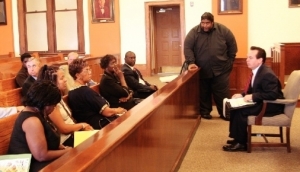Stop the Funeral Initiative meets with court officials
By Nick Hiltunen
Published in News on July 8, 2009 1:43 PM

News-Argus/BOBBY WILLIAMS
Members of the Stop the Funeral Initiative, an anti-drug crime grassroots organization, meet with court officials this morning including Judge Arnold Jones and Wayne County Prosecutor Branny Vickory about the potential of the two entities collaborating to reduce drug-related crime.
A group that hopes to change the direction of young lives entrenched in gang membership and drug sales met with Wayne County Court officials this morning.
The Stop the Funeral Initiative, which sponsors a program called the "Corner2Corner Drug Dealer & Gang Member Redemption Conference," met with Chief Superior Court Judge Albert Jones and District Attorney Branny Vickory, among others.
The "Corner2Corner" conference is intended to help people who have run into trouble with the law -- especially with narcotics and gangs -- turn their lives around.
In past years, former Judge Jerry Braswell allowed the program to be used as part of sentencing.
The group, led by Rev. William Barber, also the state president of the NAACP, hopes that newly-elected Judge Jones also will use the program in a similar way.
Jones and members of the Stop the Funeral Initiative discussed problems that young people face, and how to address them.
"When I see the person who's selling or possessing marijuana, or possessing any controlled substance -- and there's a lot of them -- it's never a huge amount. It's a small rock in their sock," Jones said of cases over which he has presided.
But that small amount can lead to much greater consequences, the judge said.
"As I say at church when I'm teaching Sunday school, your first crime is not murder," Jones said. "It's something small. It's these steps that you climb. These may be target areas where young people can benefit."
The Corner2Corner Conference is a three-day program where young drug offenders and admitted gang members take pledges to stop destructive behavior.
Barber said the program is a way to do more than simply talk about helping young people get jobs and change their lives in other positive ways.
"We had a conversation, and look at what we can do in response -- it's not just to pray, but to put some legs on our prayers," Barber said. "Some of these folk, they don't even know how to go about getting a job."
Vickory said that last year's conference was aimed at a certain demographic.
"The first conference, it was kind of hard core -- we were aiming at some people who were really having some serious problems," he said.
But the district attorney said he believes that a younger crowd may also benefit from what is presented at the conference.
"The most identifiable group of gang folks are in juvenile court," Vickory said. "They questions them more, the kids when they come in, so the district court judges in juvenile court are aware if somebody has a gang affiliation. We're talking about (age) 12 and up."
Barber said the conference could take on a "two-track" model, where both older and younger populations could benefit from separate programs.
In the meantime, Jones said he can meet with the Stop the Funeral Initiative as many as four times a year to discuss potential programs.
Jones said that the program may be a way for young people to stop seeing the judicial system as their enemy.
The judge said that both the court system and people who become defendants sometimes can use a reality check.
"They see me in that robe -- they don't see me as a person," Jones said. "But likewise, we've got to see these young people as people."
